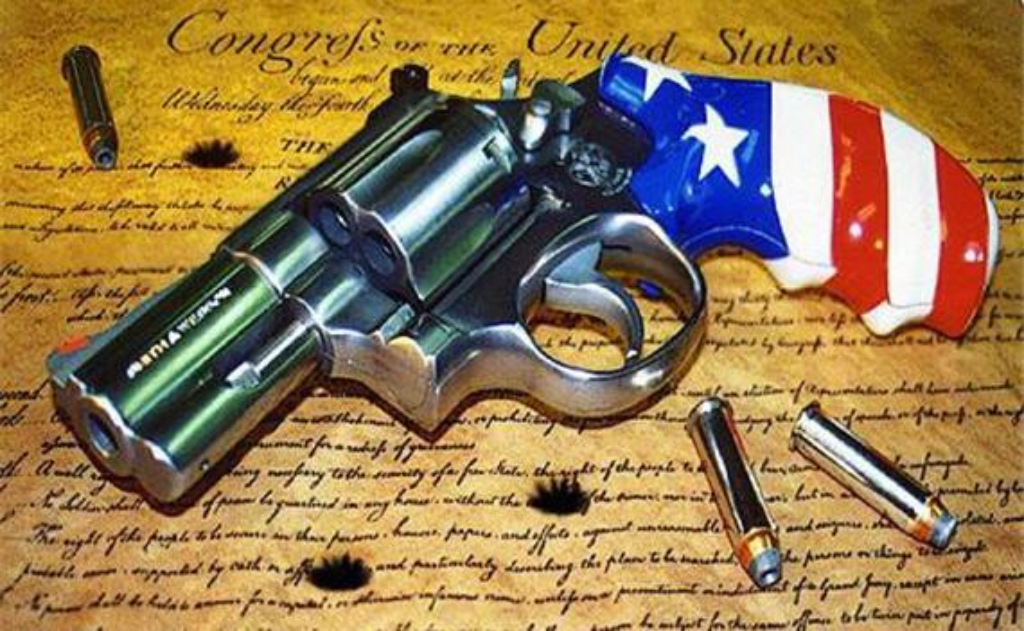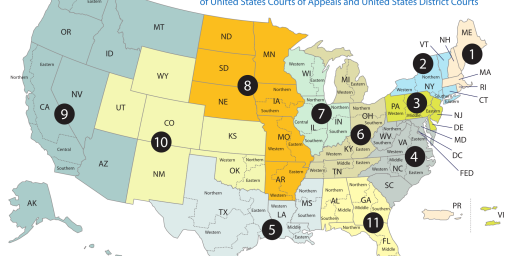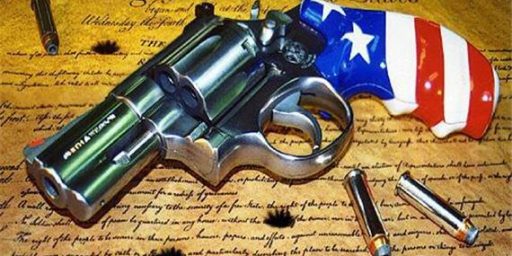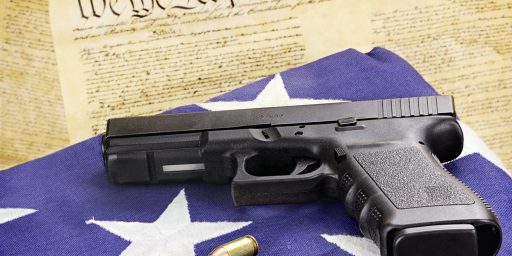Ninth Circuit Strikes Down Hawaii Law Barring Open Carry Of Weapons
A three-judge panel of the Ninth Circuit Court of Appeals struck down part of a Hawaii law barring open carry of weapons, but this win for gun rights advocates may turn out to be short-lived.

A three-judge panel of the Ninth Circuit Court of Appeals has ruled that a Hawaii law barring gun owners from openly carrying a gun in public is unconstitutional, a ruling that gives gun rights advocates a big victory but which may not withstand appeal:
A federal appeals court ruled on Tuesday that the U.S. Constitution’s Second Amendment guarantees a right to openly carry a gun in public for self-defense, finding that Hawaii overstepped its authority to regulate firearms possession outside the home.
The ruling by a three-judge panel on the 9th U.S. Circuit Court of Appeals, makes the San Francisco-based court the sixth U.S. circuit court to interpret the Second Amendment that way and could set the issue on a path toward the U.S. Supreme Court, which has not taken up a major gun rights case since 2010.
The extent of the right to gun ownership is one of the most hotly contested debates in the United States, where there has been a steady stream of mass shootings.
In a 2-1 decision on Tuesday, the panel found Hawaii infringed on the rights of plaintiff George Young when it twice denied him a permit the state requires to openly carry a gun in public.
“We do not take lightly the problem of gun violence,” Judge Diarmuid O’Scannlain wrote in Tuesday’s ruling. “But, for better or for worse, the Second Amendment does protect a right to carry a firearm in public for self-defense.”
State Attorney General Russell Suzuki said the ruling would “undermine Hawaii’s strong gun control law and our commitment to protect the public.” He added that state and local authorities would consult on what further action to take.
(…)
Alan Beck, a lawyer for the plaintiff in Tuesday’s ruling, said he believed the question about openly carrying firearms would eventually end up before the Supreme Court.
“I think the Supreme Court is receptive to this,” Beck said in a phone interview.
Judge Richard Clifton dissented from Tuesday’s ruling, saying the Second Amendment did not preclude the sort of licensing rules used in Hawaii and elsewhere.
More from The Hill:
A federal appeals court on Tuesday ruled that the Constitution’s Second Amendment grants people the right to openly carry a gun in public for self-defense.
The 9th U.S. Circuit Court of Appeals made the ruling while rejecting a claim from Hawaii officials that the right should only apply to guns kept at home.
The ruling was issued by a three-judge panel on the court and came about a year after the Supreme Court decided not to rule on the case.
Two of the three judges on the 9th Circuit voted to reverse a decision by the U.S. District Court in Hawaii that said officials did not infringe on the rights of George Young — the plaintiff who was twice denied a permit to carry a gun in public.
“We do not take lightly the problem of gun violence,” Judge Diarmuid O’Scannlain wrote in Tuesday’s ruling. “But, for better or for worse, the Second Amendment does protect a right to carry a firearm in public for self-defense.”
The court said in the ruling that it acknowledged that the Second Amendment does not guarantee a right to carry concealed firearms in public.
O’Scannlain said the court’s decision was guided in part by the Supreme Court’s 2008 ruling in District of Columbia v. Heller. In that case, the court held that the Second Amendment protects the right to have a gun in your home for self-defense.
In his dissent, Judge Richard Clifton argued that the Second Amendment does not prevent licensing rules such as the ones used in Hawaii and other states.
“Good cause licensing schemes, and extensive state regulation of public carry more generally, have a long history in the United States,” he wrote. “While explicitly declining to elaborate on specific regulations, the Supreme Court in Heller expressly noted that the right secured by the Second Amendment is ‘not unlimited’ and that there were ‘longstanding prohibitions’ that were ‘presumptively lawful.'”
In a statement, Kaena Horowitz, deputy corporation counsel for the county of Hawaii who argued the case, said the state is considering all of its options, including whether to seek a full court review of the decision.
“The Young decision is unfortunate as it invalidates Hawaii law designed to protect the safety and well-being of the people of Hawaii,” he said. “Carrying firearms in public clearly poses a significant danger to the safety of our community and greatly increases the risk that police officers confront.”
Eugene Volokh summarizes the ruling at The Volokh Conspiracy, as does his colleague David Kopel. However, rather than quoting at length from either summary, I’ll simply recommend them to the interested reader since both do an excellent job of summarizing and explaining the court’s ruling in the case, which in many significant respects goes against rulings that we have seen from other Federal Courts of Appeal, including the Ninth Circuit itself. As a preliminary matter, it’s worth noting that the panel that issued this ruling was made up two Judges appointed by Republican Presidents and one appointed by President Bill Clinton. It’s also worth noting that the Judge who wrote the majority in the opinion in this case, Judge Diarmuid O’Scannlain, also wrote the majority opinion in a 2014 panel decision that struck down a concealed carry law in California on the ground that it was too restrictive under the precedent set forth in District of Columbia v. Heller and McDonald v. Chicago. That ruling, however, was ultimately overturned by the full Ninth Circuit hearing the case en banc. That ruling was later appealed to the Supreme Court, but, mirroring an action that the justices have taken almost consistently since the ruling in McDonald, the Court declined to accept the case, meaning that the Ninth Circuit’s en banc ruling stands as the law in that Circuit.
The Hawaii law that was at issue limited the right to openly carry a weapon to security professionals, which includes not just law enforcement officers but also properly armed and trained private security guards, and the majority of the panel ruled that this was unconstitutional under both Heller and McDonald since it unduly restricted the right of civilians to defend themselves. With respect to the Ninth Circuit’s previous ruling upholding the California law on the carrying of concealed weapon, the majority essentially sought to distinguish the two laws by arguing that the open carrying of a weapon does not carry with it the same danger that someone might ambush an innocent person or a law enforcement weapon by pulling out a weapon that they were previously unaware of. Under open carry, though, everyone in the area knows that the person in question has a weapon, and that arguably has a deterrent effect on both any potential attacker and on the person possessing the weapon. Additionally, as Kopel notes in his analysis linked above, the majority relies on a long historical analysis that seems to support the idea that open carry was the historical norm until gun control laws became more common in the 20th Century. Additionally, the majority found that the historical sources that the Heller decision relied upon in its decision also recognized the existence of a general right of members of the public to openly carry a weapon in public. Therefore, the majority concludes, the right protected by the Second Amendment includes a right to openly carry a weapon.
Where the case goes from here is largely up to the State of Hawaii generally and Hawaii County in particular. As Kopel notes in his post, the country could decide to issue the Plaintiff an open carry permit, thus putting an end to the case If it did that, though, then the county could find itself in a position where it would have to start issuing permits to similarly situated applicants. Alternatively, the county could decide to deny the application for an open carry permit on the ground that the Plaintiff had not demonstrated the “need” required by the statute, a part of the law that as not before the Court in this particular case. If this happened, though, it would likely result in the Plaintiff filing a new lawsuit based on this denial and challenging that portion of Hawaii’s law.
Alternatively, the county could decide to appeal the matter in an effort to overturn the panel decision. In that regard, they would essentially have two choices. One would be to follow the strategy that was used in the California case noted above and seek an en banc hearing from the full Ninth Circuit. As I’ve noted before, it is within the discretion of the court whether or not to grant such review and would require a majority of Judges agreeing to rehear the case. Given the fact that the full Ninth Circuit has shown a tendency to overturn panel decisions that favor Second Amendment rights, there would seem to be a good chance that the Court would agree to rehear the case and, in the end, issuing an opinion that is far more favorable to the state than the panel decision. Alternatively, the county could decide to appeal the panel ruling directly to the Supreme Court. As noted in the past, though, the Court has not accepted a Second Amendment case for review since handing down the decision in McDonald in 2010. This has remained consistent even after the elevation of Justice Neil Gorsuch to the Court, but it’s unclear if that might change if and when the seat being vacated by Justice Anthony Kennedy is filled with a new Justice, presumably by Judge Brett Kavanaugh. In any case, until Hawaii County makes its decision on how to proceed, this decision will stand.
Here’s the opinion:
Young v Hawaii Et Al by Doug Mataconis on Scribd





I assume principled federalists will come along shortly to argue that this decision is wrong because: state’s rights. Right?
So, if I bought a MLRS and “openly” pointed it directly at city hill during this legal interregnum, that’s totally legal, right? And will be grandfathered in if / when cooler heads prevail?
Maybe “hire” an unpaid intern to recreate a Lil Feller or Davy Crockett? Again, openly. She would get class credit and exposure and visibility. I mean, the round is totally inert unless it lands with substantial impact. I wouldn’t even aim the thing at anything – just point it at the blameless sky in the same exact angle between my place and city hall.
I will have created a new metallurgical foundry sure to pay a boat load of taxes after we milk that tax abatement incentive. 13 years from now my foundry will pour literally hundreds of dollars into the city coffers if I decide I’m just too lazy to move it to a new state that will give me a better deal and pay any back taxes. I love race-to-the-bottom capitalism!
@Michael Reynolds: I assume principled federalists will come along shortly to argue that this decision is wrong because: state’s rights. Right?
Here, let me spell it out to you, the way principled federalists teach it to their little children, step by step and in small words.
US Constitution, Article VI, Paragraph 2:
This means that whatever the Constitution says is the law, and no state can do anything that violates the Constitution.
United States Constitution, Amendment X:
This says that the states get to make the rules as long as the matter isn’t given to the federal government or denied to the states by the Constitution.
US Constitution, Amendment II:
This says that the right to keep and bear arms is protected by the federal government.
So, since the right to keep and bear arms is specifically covered by the federal government by the Constitution, no state can ban it.
This is apparently a hard lesson for the Democrats/progressives/leftists to learn. They tried to ignore it in the 1800s, and we had to have a civil war to teach them. Then, in the 1960s, they tried to ignore it, and we had to have the civil rights movement to re-teach them.
Besides, if you took away everyone’s guns, how would you have noted leftists like Floyd Lee Corkins (egged on by the Southern Poverty Law Center) shooting up the Family Research Council and James Hodgkinson attempting the mass assassination of Republican members of Congress? Can’t have your Resistance and Revolution without guns, comrades!
@Warren Weber:
I never knew the War Of Northern Aggression was about those horrible Democrats trying to keep people from having guns. I thought it was about tariffs and states rights.
I do, however, recall that moment in the Civil Rights movement where Martin Luthor King said “I have a dream where a man will not be judged by the color of his skin, but by the gun in his hand.” Or something like that.
And thank God for Ronald Reagan, making sure that black people could carry guns in California during his governorship.
@Gustopher: I see that there’s a LOT of remedial learning to be done here.
The civil war was because the Democrats said that the states had the right to override the US Constitution.
The civil rights movement was because the Democrats kept insisting that the states had the right to override the Constitution.
The gun control movement is yet another expression of the Democrats arguing that the states have the right to override the Constitution.
This is an odd argument to make, because they don’t seem willing to share the principle. Only good liberal progressives are allowed to make the states’ rights arguments. When conservatives do it, then they’re being sexist racist homophobic xenophobic bigots and haters.
And it’s even worse when these sexist racist homophobic xenophobic bigots and haters actually cite the Constitution to back up their case.
@Warren Weber:
If you wish to avoid being dismissed (J*nos) posting transparent nonsense dredged from right wing nutjob sites ain’t the way to do it.
By your logic the government could not outlaw artillery for private use, and yet it does. So, we’ve already established that the law can and does limit gun ownership. If you were actually arguing that the 2d should be taken literally (minus all that inconvenient stuff about ‘well-regulated’ and ‘militia,’) you’d be arguing for private possession of rocket launchers, tanks and nuclear weapons.
But it’s not about the principle, it’s about your desperate need to have many guns to protect you from black men walking down the street and minding their own business.
@Michael Reynolds: I didn’t bother addressing the standard hysterical and stupid “then I want a nuclear weapon” nonsense because it’s hysterical and stupid nonsense. I focused on the points you raised. If you don’t want your stupidity exposed, then don’t be so publicly stupid.
And no, I’m not going to fall for your little bait and switch. You initially started off talking about actions by the states, and now you’re falling back on the generic “the government.”
I’m also slightly disappointed (but not surprised) that an award-winning writer would not be familiar with the notion that the meanings of words and phrases changes over time. “Well-regulated” had an entirely different meaning at the time of the writing of the Bill of Rights that has fallen out of common usage.
@Michael Reynolds: Also, I don’t own a single gun. Never have. I’ve considered it a couple of times (especially in the last few years, where your allies in the progressive movement have made politics a
contactcombat sport and have started beating and shooting people like me), but haven’t gotten to that point just yet.But there is a gun shop right up the street from home, and I might stop in some time and see what they have for handguns…
@Warren Weber:
And ‘arms’ referred to muzzle-loaded muskets and cannon. Duuuuuh. For the record, I support your right to bear any arms understood to be arms by the authors of the 2d amendment. You can even get yourself a nice brass six-pounder.
As for you not owning a gun, you’re a well-known liar, J*nos, there is not a single reason for anyone to ever believe anything you say.
@Warren Weber: “But there is a gun shop right up the street from home, and I might stop in some time and see what they have for handguns…”
Oh, noes! Baby Jenos is going to get a gun and then he won’t have to put up with mean liberals being all mean to him and stuff… I mean, when he gets around to it, which will certainly be sometimes, because it’s not possible he’s just a loudmouth, know-nothing troll haunting sites from which he’s been asked to leave.
@Michael Reynolds: So, you’re arguing that the “arms” covered by the 2nd Amendment include contemporary military-grade weaponry? Interesting point. Not an argument I’d want to make, but you’re a grownup.
The alternative, of course, is to say that the 1st Amendment only covers communications methods that existed at the time of the founding. So no radio, no TV, no internet. Hell, no copiers or printers more advanced than movable type.
But to the topic at hand: can states pass laws that directly circumvent the US Constitution? The answer is no. I thought we settled that when the Democrats made that argument back in the 1860s and again in the 1960s. I also thought we’d have until the 2060s before it came up yet again, and I’d be long dead and wouldn’t have to deal with it, but oh well…
@Warren Weber:
I see. So the 2d amendment should be taken literally except when you don’t want it to be. Got it.
FYI, all the amendments are subject to interpretation. We even have limits on free speech. For example, the FCC does regulate broadcast speech. Right? So your example actually proves my point, not yours. The states and the feds also regulate weapons available to the public. No machine guns, for example. Right?
@Michael Reynolds: states rights is a conversation about things that are not already explicitly written into the Constitution. Like for example the Second Amendment.
You’re welcome.
@Michael Reynolds: The topic at hand is whether or not the states have the right to completely abrogate the 2nd Amendment. You seem to want to argue that they do.
Actually, you don’t seem to want to argue that, or even discuss that at all. So instead of joining you on your little off-topic digression, I’ll reserve myself to the topic at hand.
And by the way guys, the night circus is among the most liberal in the country. If even they look at the Constitution and come to the conclusion that they did, it’s an indication as any I can think of that your interpretation of the whole thing is way out of line
@Warren Weber:
Yes, exactly, I’m with Antonin Scalia on gun regulations.
in 2008, in Heller, the Supreme Court affirmed that Americans have a constitutional right to possess firearms for self-defense, at least within homes, and Justice Scalia, wrote the majority opinion, and said that “the right secured by the Second Amendment is not unlimited.”
@al Ameda: So you’re agreeing with the “keep” part, but not so down with the “bear” part? How generous of you.
@Warren Weber:
I’m with the “the right secured by the Second Amendment is not unlimited.” part.
Of course people can have guns, and aspects of acquiring, bearing, and using weapons may be regulated. I personally do not see very much value in permitting so-called ‘average citizens’ to open-carry (or conceal-carry) weapons in public venues.
But I understand reality, a vocal minority of Americans are obsessed with guns and they currently control the debate.
@al Ameda: But I understand reality, a vocal minority of Americans are obsessed with guns and they currently control the debate.
It helps that these obsessives are very well-funded by people like Mike Bloomberg, Bill DeBlasio, and a host of other gun-grabbers.
@Michael Reynolds:
F**k that. I want a few fusion warheads, some missiles, and some LAWs and RPGs to keep the Big, Bad Gummint away.
@Warren Weber:
Bloomberg? He’s not obsessive, he’s a sensible person who recognizes that, as Scalia said, “the right secured by the Second Amendment is not unlimited.”
The Right is obsessed with so-called “gun-grabbers.”
@Warren Weber: “It helps that these obsessives are very well-funded by people like Mike Bloomberg, Bill DeBlasio, and a host of other gun-grabbers.”
And the other side is very well funded by the Russian government.
@wr: Please. You’ve shown enough how ignorant you are; you don’t need to keep proving it.
The Russian government isn’t very well funded by the Russian government. Their economy is pathetic. They needed to get Germany to buy their gas to keep the lights on in Moscow.
Please DFTFT.
@Warren Weber:
Well that explains why Trump wants to throw our European allies under the bus.
@Warren Weber: let’s not dance around calling a spade a spade — it wasn’t Democrats supporting slavery, it was racist white Southerners; and it wasn’t Democrats opposed to civil rights, it was racist white Southerners; and they weren’t asserting states rights in unprecedented ways, the federal government was weaker before the Civil War and “separate but equal” was permitted for the next hundred years.
And all of that has jack-shit to do with guns and the second amendment.
We put limits on what guns people can have and where they can have them all the time — you cannot bring a machine gun into the state house.
Why is fully automatic banned when semiautomatic not? The second amendment is silent.
Why can you bring a gun to a public street, but not a courthouse? The second amendment remains silent.
Why is concealed carry permit-only in some states but not other? The second amendment is again silent.
The only question is where the lines should be drawn, not whether lines should be drawn.
And you are ridiculous.
Love your post, 100% correct.